Newsletter
Weibo Watch: Ghost Scales
From national pride to social distrust, these are the most noteworthy trends and topics dominating Chinese social media recently.
Published
8 months agoon

PREMIUM NEWSLETTER | ISSUE #18
This week’s newsletter:
◼︎ 1. Editor’s Note – Ghost Scales
◼︎ 2. What’s Featured – A closer look at the featured stories
◼︎ 3. What More to Know – Highlighting 8 hot topics
◼︎ 4. What Lies Behind – Observations beyond the headlines, by Miranda Barnes
◼︎ 5. What’s Noteworthy – Lu Xun turning in his grave?
◼︎ 6. What’s Popular – China’s very own ‘pride walk’
◼︎ 7. What’s Memorable – The school in Changzhou that made students ill
◼︎ 8. Weibo Word of the Week – “Toxic Fangirling”, by Ruixin Zhang
Dear Reader,
‘Ghost scales’ have been all the talk on Weibo lately. The term, guǐ chèng (鬼秤), refers to inaccurate scales used to cheat customers by providing less than the actual quantity for the price paid.
The topic of ghost scales came up when a well-known Chinese blogger recently exposed how many sellers in Dalian markets were actually using deceptive weighing scales, duping ordinary customers buying their vegetables, fruit, or seafood. On Weibo alone, one related hashtag page garnered nearly 250 million views.
Despite local authorities stepping up to investigate and punish fraudulent sellers tampering with scales, the incident ignited anger beyond Dalian. People questioned why it took an internet influencer to advocate for consumer rights and why there aren’t better regulations in place to combat fraud. Rather than blaming the fraudulent sellers, online anger was mostly directed at the systems allowing them to operate.
The ghost scale story does not stand by itself. Much smaller stories have gone viral before, such as the customer who discovered that the 200g of tripe he ordered for 72rmb ($11) at a local Haidilao restaurant was actually only 138g. A related hashtag received over 260 million views on Weibo in 2021. “Next time I’m bringing my own scale,” some commenters replied.

The vlogger, superB太, exposing the fraudulent scales in Dalian.
Is it much ado about nothing? Not really. Although the stories differ, the common theme behind many of these online discussions is distrust. Recently, various topics highlighting low societal trust have trended.
One revolved around the Heilongjiang gym collapse. Three Chinese middle school students died in November when their gymnasium roof collapsed after heavy snowfall. It was the second gym collapse incident in the province this year. Netizens argued that better inspections, quality checks, and stricter public safety regulations could have prevented the tragedy.
Another example is the recent controversy about fake birthing certificates being sold by a hospital in Xiangyang for use by human trafficking brokers. The head of the hospital and five others were soon detained after the story, exposed by a Chinese investigative vlogger, went viral. Many questioned how such a thing could still happen in 2023.
The recurring idea in these online discussions is that existing constructions at various levels in Chinese society allow such practices to happen, with people supposedly covering for each other and turning a blind eye during inspections. While a market might have actual ‘ghost scales,’ similar deceptive operations could occur at a hospital management level, at a construction site, or within a coal mine company.
A few years ago, the development of China’s Social Credit System was often portrayed as a gloomy sci-fi storyline by many Western media outlets. Even today, there are many people who think that China has a system in place as depicted in the American Black Mirror series, which shows a dystopian society where people are judged by a numeric rating given to them by their interactions with other people.
Many people and media outlets not only misunderstood the Chinese ‘Social Credit System’; they also overlooked the historical, social, and culturally rooted factors that play a crucial role in understanding how such a system, designed to enhance societal trust, could actually be embraced. (For accurate and nuanced perspectives on the social credit system, Vincent Brussee has just published a new book that delves into these complexities.)

In the Black Mirror episode ‘Nosedive’, people’s position on the social ladder is determined by other people ranking them.
In making a distinction between ‘high-trust societies’ and ‘low-trust societies,’ Francis Fukuyama (1995) classified China as a ‘low trust society,’ where people have very little trust in people outside their family or close groups. Though not everyone agrees with Fukuyama, the idea of being cheated or becoming a victim of fraudulent practices regularly trends on China’s internet. Small incidents represent more significant issues.
After the Dalian ghost scale incident went viral, multiple people took the initiative to test scales in their own neighborhoods. A student from Henan University, a livestreamer from Shenyang, a reporter from Nanchang—each contributed to exposing local street vendors or restaurant owners using ghost scales to cheat customers.
The domino effect of ghost scales being exposed demonstrates the powerful dynamic of Chinese social media. Untrustworthy individuals lacking integrity can be swiftly exposed, and their fraudulent businesses crumble within hours. Chinese influencers, vloggers, and commentators play a major role in addressing various social issues, from scamming sellers to corrupt doctors, and actually make a change.
Some netizens recently commented that their local market sellers would not dare to use ghost scales anymore. In the meantime, however, while the fight for consumer rights and social injustice continues, it could never hurt to bring your own trustworthy scale.
Miranda Barnes and Ruixin Zhang have contributed to this week’s newsletter.
Best,
Manya (@manyapan)
* Francis Fukuyama. 1995. Trust: The Social Virtues and the Creation of Prosperity. New York: Free Press
What’s Trending
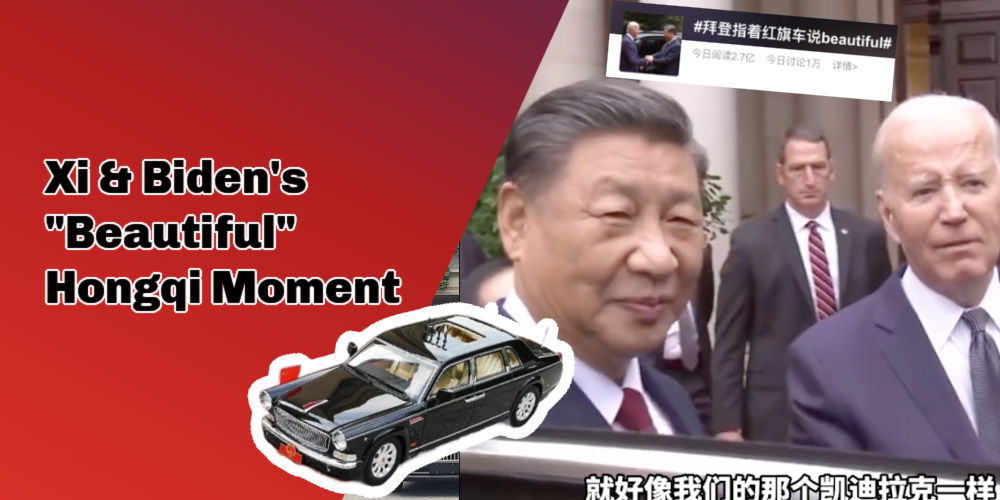
1: National Pride and Shifting Dynamics in Sino-American Relations | The Xi-Biden meeting was one of the biggest topics of the week. After the much anticipated face-to-face talk in California, one noteworthy detail quickly hit Weibo’s top trending topics, namely Biden’s apparent admiration for Xi Jinping’s Hongqi car. The recognition of the decades-old Chinese Hongqi brand by a U.S. president was a promotion-worthy moment for Chinese official channels, resonating with netizens.
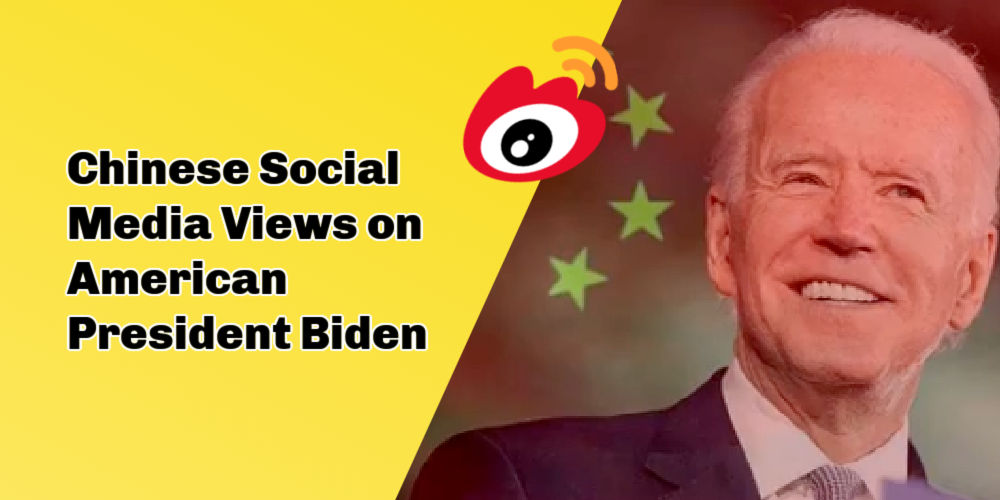
2: ‘Sleepy Joe’ and ‘Revive the Country’ Biden | From positive portrayals by official channels to online banter and critical voices discussing Biden’s global policies and his health, there are various sentiments on Chinese social media surrounding US President Joe Biden. At a time when anti-American sentiments are on the rise, some netizens view Biden as embodying the negative stereotypes prevalent on social media about the United States or the Western world in general. But in the days leading up the Xi-Biden meeting Chinese official channels are promoting more positive portrayals of the U.S. leader.

3: The Sun-Yat Sen Hospital Controversy | Several medical workers who all worked at the same renowned oncology lab in Guangzhou recently were diagnosed with cancer. Although there are many concerns about whether or not their cancer is related to their working environment, the primary source of public outrage revolves around the handling of the controversy by the affiliated hospital.

4: Douyin Introduces Paywalls | The introduction of a Douyin novel feature, that would enable content creators to impose a fee for accessing their short video content, has sparked discussions across Chinese social media. Although the feature would benefit creators, many Douyin users are skeptical. Would this be a new beginning for the Chinese TikTok, or would it be the end?
What More to Know
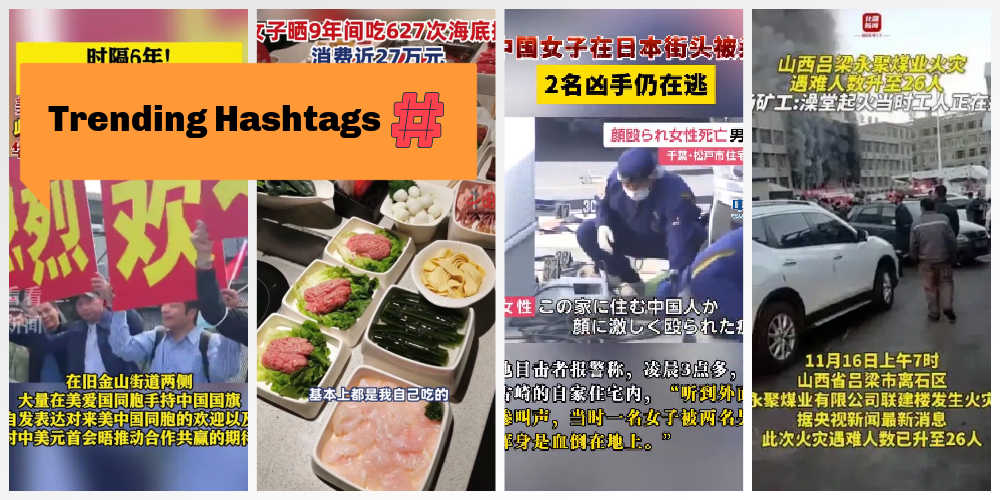
◼︎ 1. TAOBAO CRASHES DURING SINGLE’S DAY SALES | China’s largest online shopping event of the year, Single’s Day, took place on November 11 for the 15th time. Despite concerns over China’s economy, Chinese e-commerce giants Alibaba and JD.com once again saw record sales, although, similar to last year, they did not release their full results. One topic that generated enormous attention on the day itself was Taobao, Alibaba’s e-commerce platform, becoming unreachable before the end of the day, leaving millions of online shoppers clicking and refreshing as the platform kept crashing due to the surge in traffic. (Weibo hashtag “Taobao Down” #淘宝崩了#, 2.6 billion views).
◼︎ 2. SIMBA DOUYIN ACCOUNT BLOCKED | Earlier this month, Chinese famous Kuaishou livestreamer Simba (辛巴, real name Xin Youzhi) became a top trending topic after his Douyin account, where he had over four million followers, was banned. Although the official reason for his suspension was not explicitly stated, it reportedly related to the fact that Simba, among others, had scolded the Douyin platform. Simba, the king of Kuaishou, is known for getting into controversies and arguing with other livestreamers and companies. Now, he can add ‘arguing with platforms’ on his list as well. (Weibo hastag “Simba Douyin Account Banned” #辛巴抖音账号被封禁#, 390 million views).
◼︎ 3. MURDER IN MATSUDO | In the morning of November 9, Japanese police Matsudo discovered a woman covered in blood on the streets of the city’s Kogasaki district. She was later pronounced dead at the hospital. The woman was a 33-year-old Chinese national who reportedly resided in the Japanese city. She was fatally attacked and beaten by two men in the early hours of the morning and was left to die in the streets in a pool of blood. (Weibo hashtag “Chinese Woman Murdered on Streets in Japan” #一中国女子在日本街头被杀害#, 350 million views, read more here)
◼︎ 4. CHINESE CROWDS CHEERING IN SAN FRANCISCO | Apart from the Xi-Biden talks and APEC in general, what caught significant attention on Chinese social media this week was the enthusiastic reception of Xi Jinping by Chinese crowds in San Francisco. On November 14, the day of his arrival in the US, flag-waving crowds gathered along Xi Jinping’s route from the airport to the hotel. Chinese official media actively shared news about their presence, while protests critical of Xi and addressing human rights issues in China went unreported. In contrast, the pro-Palestine protests during APEC did receive media attention, highlighting a media bias in determining which public voices and flag-waving actions were deemed hashtag-worthy and which were silenced. (Weibo hashtag “Crowds of Chinese/Overseas Chinese Form Welcome Crowd in San Francisco,” #华人华侨在旧金山组成欢迎人群#, 170 million views.)
◼︎ 5. CHINESE INTERNET CELEBRITY DROWNS | News about a Chinese national drowning in Bali became top trending on Weibo on November 9 when it was revealed that the 34-year-old man was the popular Chinese influencer Jhony Huang (仲尼), also known as XFJ or Huang Xiaofeng (黄小沣). The tragic incident reportedly occurred when Huang was swept away by waves and struck by a large wooden object while swimming with his wife at Batu Belig Beach during their vacation. His wife, the Ukrainian Karina Melynychuk, was also hospitalized but did not sustain serious injuries. According to local reports, Huang’s lifeless body was discovered floating approximately 100 meters from the Petitenget Beach shoreline. (Weibo hashtag “34-Year-Old Chinese Male Drowns in Bali” #一名34岁中国男性在巴厘岛遇难#, 910 million views; “Jhony Drowns After Hit by a Large Log” #仲尼系遭大木头撞击溺亡#, 140 million views).
◼︎ 6. BIRTH CERTIFICATE SCANDAL | A hospital director and seven staff members are currently being investigated for reportedly selling counterfeit birth certificates for trafficked babies. The controversy emerged when a Chinese anti-human trafficking campaigner posted a video on Douyin, accusing Jianqiao Hospital in Xiangyang (襄阳健桥医院) of fabricating birth certificates and charging approximately 96,000 yuan ($13,165) for them. On social media, netizens expressed shock that such practices are still occurring in 2023, and there was surprise that the case was brought to light by a volunteer rather than being uncovered by authorities (Weibo hashtag “Xiangyang Announcement on Jianqiao Hospital Selling Birth Certificates Problems” #襄阳通报健桥医院贩卖出生证问题#, 27,8 million views).
◼︎ 7. FIRE IN SHANXI | A fire that broke out on the morning of November 16 in a coal firm office building in Lüliang, Shanxi province, claimed the lives of at least 26 people and resulted in 38 injuries. The blaze ignited in the four-story building containing offices and dormitories. The incident adds to a series of safety concerns in China’s coal industry – the building in question is affiliated with the Yongju Coal Group (永聚煤矿), a mayor player in the region’s coal mining sector. By now, 13 people related to the company, including executives, are facing criminal measures for their responsibility in the incident. (Weibo hashtag “Shanxi Yongju Coal Company Fire Claims 26 Lives” #山西永聚煤业火灾已致26人遇难#, 65 million views).
◼︎ 8. WOMAN SPENDS FORTUNE ON HOTPOT | A 32-year-old woman from Nanjing, China, grabbed attention on Weibo this weekend by revealing that she had spent nearly 270,000 yuan (over $37,400) at China’s renowned hotpot chain, Haidilao, in the past nine years. The hotpot enthusiast, named Kong, joined Haidilao as a member in 2014, and in that time, she indulged in over 627 hotpot dinners. Occasionally, her cravings led her to visit the restaurant more than 12 times a week, even enjoying hotpot for breakfast. (Weibo hashtag “32-Year-Old Woman Spent 270k at Haidilao in 9 Years” #32岁女子9年花费近27万吃海底捞#, 150 million views).
What Lies Behind

The Story of Li Jun and Liang Liang
In recent days, the challenges faced by an ordinary young Chinese couple who purchased an unfinished property have sparked extensive discussions on Chinese social media, shedding light on broader trends that lead some young people to seek an escape from the urban struggle and striving for a better everything (better housing, better jobs, better education) – they just want to “lie flat” (躺平) instead.
Last year, the couple, Li Jun (丽君) and Liang Liang (亮亮), first became popular on Chinese social media as they shared their journey of buying a property and building a life in Zhengzhou, Henan Province. They put a deposit on an off-planned apartment, eagerly anticipating its delivery in three years. Excited about their new home, they regularly updated their progress on Douyin, showcasing their savings efforts and monthly visits to the construction site.
However, after eight months, the developer faced financial issues, causing a halt in construction. In later videos, the couple appeared frustrated and disillusioned. Their daughter was born during this time, adding to the financial strain of rent and mortgage payments without a clear timeline for moving into their future home. Many others faced similar challenges. Authorities intervened, promising a delayed delivery. The initial contract included a 20,000 RMB ($2775) rebate for buyers, but the couple faced rejection and insults when demanding payment. In a recent altercation, the husband was beaten by developer personnel, and the wife’s phone was snatched as she tried to record the situation.
Their Douyin videos reflected the emotional rollercoaster of an ordinary Chinese couple facing setbacks despite following the traditional path of education, hard work, marriage, saving, property ownership, and starting a family. They are one of thousands of millions of ordinary Chinese people, who give their best effort despite all the struggles. Many were asking, would their life have been different if they had decided to ‘lie flat’ instead? And who is to blame for the fact that, despite all of their hard work and commitment, their ‘Chinese dream’ is taken away from them?
What’s Noteworthy
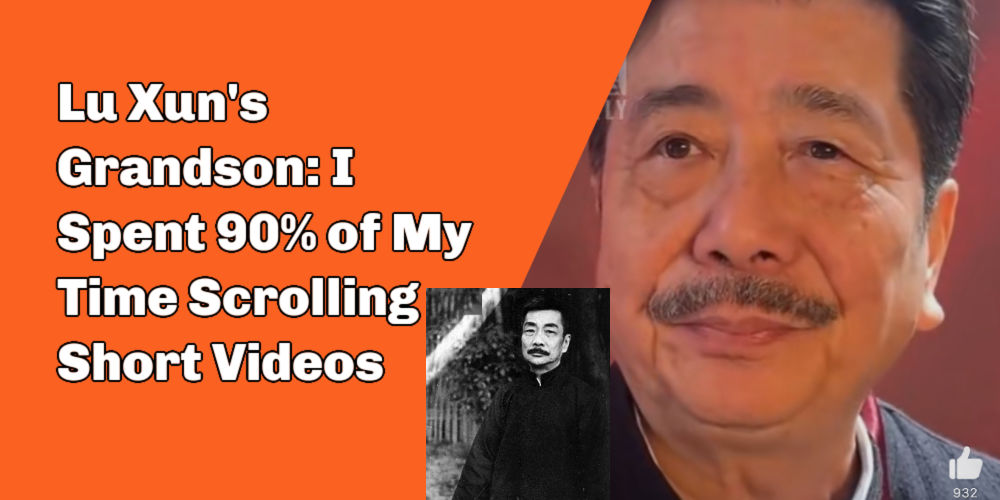
Lu Xun Turning in His Grave? | Lu Xun (魯迅, 1881-1936) stands out as one of China’s most notable and influential authors of the twentieth century. This esteemed Chinese writer, essayist, and literary critic unexpectedly found himself at the center of China’s social media discussions this week following an interview with his grandson, Zhou Lingfei (周令飞), during the Mao Dun Literature Award ceremony (茅盾文学奖) on November 17 in Wuzhen.
During the interview, Lu Xun’s grandson was asked about his online and reading habits. In a light-hearted response, Zhou humorously shared that he spends approximately 90% of his time watching short videos and 10% of his time reading books. A related hashtag (#鲁迅孙子自称90%刷视频10%看书#) went viral on Weibo, amassing over 190 million clicks.
The topic received so much interest due to various reasons. For one, as Lu Xun is widely regarded as the greatest Chinese writer of this century, people would expect his grandson to also be a man of literary knowledge and wisdom – they simply did not expect him to say he scrolls apps like Douyin and Kuaishou on a daily basis. Another reason is that it underscores a broader trend where people spend more and more hours on their phone mindlessly scrolling videos instead of engaging in study and learning. While some criticized Zhou for his comments, others also praised him for being authentic, straightforward and honest, just like his grandpa.
What’s Popular
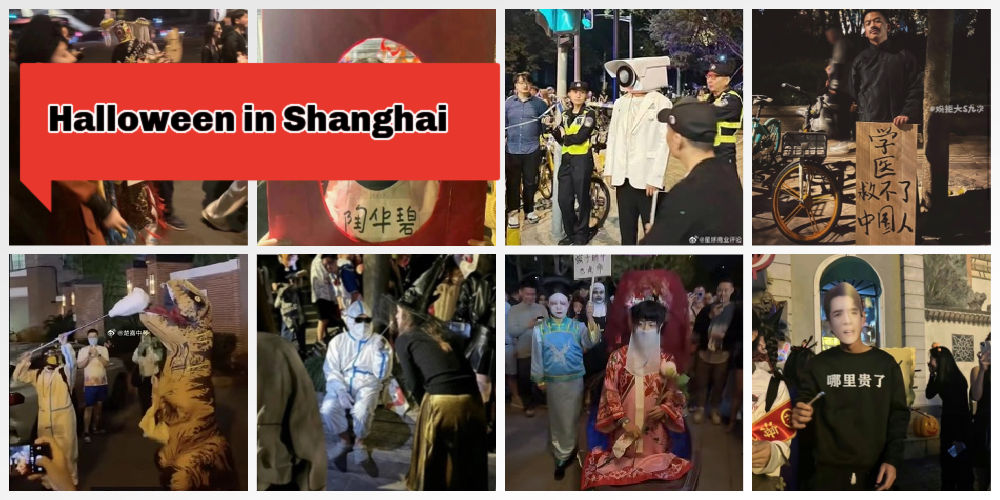
Halloween Outfits Reflecting Social Trends | Since our last newsletter was all about What’s on Weibo’s 10-Year Anniversary, we’d still like to take a moment to reflect on the celebration of Halloween in Shanghai this year as it caused a frenzy on the Internet.
Rather than traditional Halloween themes, young people on Shanghai’s Julu Road brought pop culture memes and social phenomena to life with their creative costumes. You could spot some dressed as the Lipstick King Li Jiaqi, who recently got caught up in controversy, or as “Dabai,” the anti-COVID workers in protective suits. This playful and unconventional celebration received praise from netizens across China.
The debate about whether or not people should be celebrating Western festivals often surfaces on Chinese social media during Halloween. However, the massive street party in Shanghai seemed to silence the critical voices this year. It appears that they reached a consensus; this Halloween celebration isn’t just about a Western festival, it’s an opportunity to let loose and express bottled-up emotions in a spooky and festive atmosphere. Whether dressed as writer Lu Xun making a statement or portraying a mobile surveillance camera, everyone found a haven for unrestrained self-expression. A comment under a photo recreating a scene from “Farewell My Concubine” captured the spirit: “Shanghai’s Halloween party has turned into China’s very own pride walk.”
With recent administrative rules turning Chinese New Year’s Eve into a regular workday, many young people express that they no longer care about a festival’s tradition and simply want to have some fun. One noteworthy viral video from Julu Road featured two guys dressing as legendary singers Feya Wong and Na Ying, performing a classic duet from the 1998 Spring Festival Gala. Netizens dubbed it the young generation’s Spring Festival Gala – a celebration of fun and creativity where happiness is the main focus.
What’s Memorable
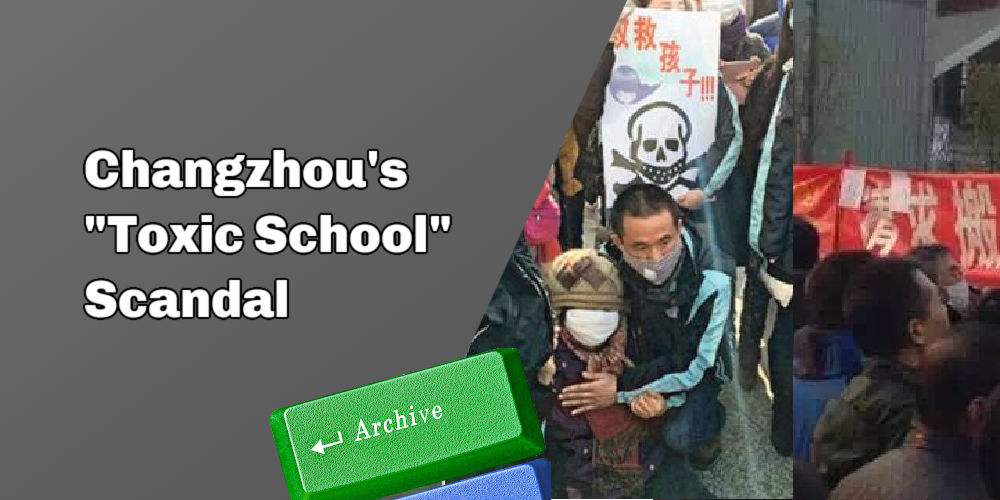
Changzhou Chemical Factory School Scandal | This week’s archival pick revisits a significant incident from eight years ago that fueled public distrust. In 2016, a major controversy unfolded around a middle school in Changzhou, where almost 500 students fell seriously ill, some diagnosed with leukemia. The health issues emerged after the school relocated to a new area near a chemical factory in September 2015.
Upon investigation, it was revealed that air and water pollution from nearby chemical plants was the cause. The news triggered widespread anger and discussions on social media, with netizens questioning the contrasting facts that emerged. The incident brought to light not only broader concerns about environmental safety and public health in China but also underscored a deep-seated distrust between parents and schools, citizens and local authorities, and netizens and official media.
Weibo Word of the Week
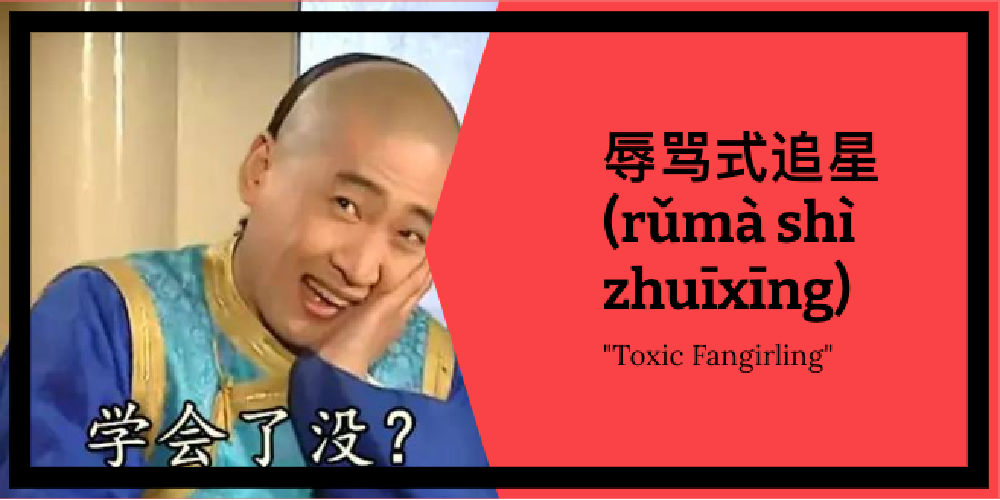
“Toxic Fangirling” | Our Weibo Word of the Week is “辱骂式追星” (rǔmà shì zhuīxīng), which translates to “toxic fangirling” or “toxically rooting for someone.”
In China’s ever-evolving fan culture, the phenomenon of ‘rǔmà shì zhuīxīng‘ (辱骂式追星, lit: ‘abusive-style celebrity admiration’) or toxically fangirling has recently become a trend. This term refers to a rather extreme way for fans to engage with their their idols. When pleased, they express intense love and support for their idols, but they can turn into abusive trolls targeting their idols when dissatisfied. This shift from love to aggression can be triggered by small things, like an unflattering photo or an unsatisfactory performance. Initially viewed as a departure from blind loyalty, this fan behavior has now turned somewhat toxic.
Recently, this term has sparked discussions likening this kind of online behavior to toxic parent-child relationships in Chinese society. The hashtag “Asian parents toxically rooting [for their children]” (#东亚父母辱追#) gained traction on Weibo. A top viral quote joked, ‘My parents toxically root for me every day; as long as they’re paying, they feel they can insult me all they want.’ These discussions touched upon the issue of how many Chinese parents seem to follow a strict and demanding parenting approach, where children need to adhere to high standards and are only praised or acknowledged when high standards are met. If this is not the case, parents will scold or discipline their children in the name of ‘love.’
Netizens interpret this ‘toxic fangirling’ phenomenon half ironically, half seriously, suggesting its origin may be rooted in the collective childhood trauma of Chinese fangirls. Similar to how a dragon-slaying warrior can become an evil dragon, traumatized children may choose to whip their loved ones into what they desire.
This is an on-site version of the Weibo Watch newsletter by What’s on Weibo. Missed last week’s newsletter? Find it here. If you are already subscribed to What’s on Weibo but are not yet receiving this newsletter in your inbox, please contact us directly to let us know.
Stories that are authored by the What's on Weibo Team are the stories that multiple authors contributed to. Please check the names at the end of the articles to see who the authors are.

Newsletter
Weibo Watch: The Future is Here
The future is here, but it looks different than we expected. This Weibo Watch covers driverless taxis and other noteworthy, popular topics.
Published
4 days agoon
July 23, 2024
PREMIUM NEWSLETTER | ISSUE #33
This week’s newsletter:
◼︎ 1. Editor’s Note – The future is here
◼︎ 2. What’s New and Noteworthy – A closer look at the featured stories
◼︎ 3. What’s Trending – Hot highlights
◼︎ 4. What’s Remarkable – A panicked mum goes to extremes
◼︎ 6. What’s Popular – The passing of Cheng Peipei
◼︎ 7. What’s Memorable – Virtual news anchors
◼︎ 8. Weibo Word of the Week – Bye bye, Biden
Dear Reader,
The future is here, and it is all unfolding so much differently than we could have imagined.
Scrolling through Douyin and Weibo’s video feeds recently, there are hundreds of videos about China’s self-driving taxi revolution. The wonder and excitement over the unmanned cabs is not surprising – it is the biggest thing happening in China’s taxi industry since ride-hailing apps Didi, Kuaidi, and Uber first entered the Chinese market over a decade ago.
Luobo Kuaipao (萝卜快跑) by Baidu, called ‘Apollo Go’ in English, is the ‘robotaxi’ ride-hailing platform that is now generating the most attention online. The concept is simple: customers order the taxi via the app and enter their destination, it arrives at the meeting point, and via a panel on the side of the car, the customer inserts the last four digits of their phone number. The door then automatically opens, and they can get in the car, which will take them to where they want to go. The car is private, and the price is comparable to ride-sharing fees, but then cheaper.
There is an additional benefit: the cars are equipped with a “smart cockpit”, allowing passengers to start their journey by tapping the screen in front of them, selecting a podcast or their favorite music, controlling the air-conditioning, and watching the traffic while en route.
Currently, Luobo Kuaipao has some 500 robotaxis operating without safety drivers in Wuhan, now the world’s largest city for driverless taxis. Baidu plans to expand this fleet with an additional 1,000 robotaxis soon. Shanghai will also launch a public testing program for driverless taxi services by SAIC in the upcoming week.1
Across China, at least 16 cities are now testing self-driving vehicles, with at least 19 Chinese car manufacturers competing for global leadership. Nationwide, 20 provinces have already released policies and regulations for autonomous driving.23
In many bigger Chinese cities, smart autonomous vehicles are already part of daily life. For years now, autonomous cleaning cars have been a common sight in popular tourist spots. I remember seeing a cute little car working hard to clean the area around the Terracotta Warrior museum in Xi’an in 2019. There are also self-driving tourist shuttles, driverless trucks operating between Beijing and Tianjin, and AI-driven service carts that precisely know where crowds gather during lunch breaks, stop when people wave, and process mobile payments for hamburgers or chicken salads on the spot.
So far, so ‘futuristic.’
But it’s not all roses. Besides the many enthusiastic videos taken by Chinese riders posting their experiences of taking an unmanned, self-driving taxi for the very first time, the emergence and rising popularity of robotaxis is also leading to worries, complaints, and aggravation.
A commonly heard objection to the unmanned taxis is that they are taking away jobs in the taxi industry. Perhaps even more so than when ChatGPT first emerged, the question of AI replacing people rather than serving them is frequently popping up, with taxi drivers fearing they’ll lose their jobs as robotaxis spread throughout China. These worries can still be countered by the numbers. After all, Wuhan has more than 100,000 registered ride-hailing cars, and Luobo Kuaipao holds just around 0.40% of the market – an insignificant number. 4 But with the rise of the industry, including its competitive prices, that number is bound to change.
Another far more unexpected concern about the rise of China’s robotaxis is that they’re causing chaos in the streets by being ‘too polite.’ These autonomous taxis are trained to follow the traffic rules and act civilized in traffic – something that seems out of place in some areas, where not following the rules almost seems like a rule.
By staying in the right lane, stopping for red lights, and giving priority to other cars, pedestrians, and animals, Chinese robotaxis are causing road congestion and sometimes accidents. They often struggle with complex traffic situations; for example, a viral video showed two Luobo Kuaipao cars waiting for each other to move, holding up traffic. In Wuhan, where drivers are known for their aggressive driving style, these autonomous cars face additional challenges. They strictly follow traffic laws and are not accustomed to pushing their way into traffic, which can lead to long waits for simple turns or merges, causing delays for other drivers.
This behavior has earned them the nickname ‘Sháo Luóbo’ (勺萝卜, “silly radish”), suggesting they are sluggish, or dumb. Although Luobo Kuaipao translates to ‘Radish Runs Fast’ or ‘Carrot Run,’ implying speed and efficiency, the reality is quite different.
Also unexpected is how ‘driverless’ is not what you might have thought it is; because every car still has a “safety operator” who is remotely monitoring it from another location. One person can monitor 10 cars or even more, but they’re allegedly penalized if they close their eyes for more than three seconds.5 Videos and pictures from these robotaxi headquarters sometimes look like old-fashioned game halls or internet cafes.
Complaints about Luobo Kuaipao not being as modern as people hoped and not being as assertive as they thought ultimately boil down to a clash of cultures. Luobo Kuaipao is made in China, but it’s not programmed with the personality and ways of a Wuhan taxi driver. In the end, Wuhan drivers will need to learn from Luobo Kuaipao, and Luobo Kuaipao will need to learn from Wuhan traffic. One side will learn to become more ‘polite,’ while the other will need to add some ‘aggression’ in order to mix in with traffic.
As ‘silly’ as Luobo Kuaipao may seem now, let’s not forget that everything starts small – we all began in diapers. Nothing significant ever came without humble beginnings. The future is here, but what we consider truly ‘futuristic’ will perhaps always be a vision for the days to come.
Miranda Barnes and Ruixin Zhang have contributed to the compilation and interpretation of some topics featured in this week’s newsletter. As always, if you have any observations or ideas you’d like to share, please don’t hesitate to reach out to me.
Best,
Manya Koetse
(@manyapan)
References:
1 Wu Qingqing 吴青青. 2024. “The Luobo Kuaipao Versus Tesla War”[萝卜快跑,与特斯拉终有一战].” Auto Business Review (汽车商业评论), July 18 https://inabr.com/news/19693 [Accessed July 22, 2024].
2 Bradsher, Keith. 2014. “China Is Testing More Driverless Cars Than Any Other Country.” New York Times, June 14 https://www.nytimes.com/2024/06/13/business/china-driverless-cars.html [Accessed July 22, 2024].
3 Qi Xu 齐旭. 2024. “Which City is China’s First City for Autonomous Driving? [谁是中国自动驾驶“第一城”?]” China Electronics News 中国电子报, July 16 https://new.qq.com/rain/a/20240716A00W2N00?suid=&media_id= [Accessed July 22, 2024].
4 Wu Qingqing 吴青青. “The Luobo Kuaipao Versus Tesla War.”
5 Jones, Phil. 2014. “Behind Driverless Cars – The Safety Operators Who Can’t Close Their Eyes[无人驾驶车背后,是无法闭眼的安全员].” The Paper, July 19 https://m.thepaper.cn/newsDetail_forward_28124126 [Accessed July 22, 2024].
What’s New

“As smooth as a flying bullet” | The assassination attempt on former US President Trump at a Pennsylvania campaign event also became a major topic on Chinese social media, where Trump’s swift reaction and defiant gesture after the shooting have not only sparked discussions but also fueled the “Comrade Trump” meme machine.

Park with a view | “The ‘sea in Ditan Park’ is a perfect example of how Xiaohongshu netizens use their imagination to change the world,” a recent viral post on Weibo said. This seaview spot in the Beijing public park has become a new ‘check-in spot’ among Chinese Xiaohongshu users and influencers.

From Hollywood to Beijing | For the Dutch national broadcaster’s summer series ‘From Hollywood to Bollywood,’ I spoke about the Chinese blockbuster Battle at Lake Changjin (2021) this week. This spectacular war film depicts the story of Chinese troops during the massive Battle of the Chosin Reservoir in the Korean War, where they encircled and pushed back American forces. The film is an impressive visual spectacle, but it’s a landmark movie in other aspects as well. Under the leadership of President Xi Jinping, China is striving to become a global powerhouse in the film industry. At the same time, this film also helped shape new narratives of the Korean War that foster patriotism. Dutch readers can listen to or watch the entire conversation via the link. If you’re interested in learning more about this topic but not that good at understanding Dutch—nobody’s blaming you—check out this article on WoW from our archive.
What’s Trending
JULY 11
🛢️🍳 Cooking Oil Scandal | A major news topic that’s been fermenting over the past month is the revelation that some cooking oil transport trucks in China are also being used for transporting industrial oil. The issue went trending after a publication by Beijing News authored by investigative journalist Han Futao (韩福涛) on July 2, which detailed how the same tanks were used for transporting both edible oils like soybean oil and chemical oils like kerosene without any cleaning process. The food safety scandal sparked outrage online and led to people meticulously tracking the whereabouts of oil tankers and how they operate, while various tanker companies came forward to provide clarity on their procedures. The incident has raised significant awareness about the potential misuse of tankers and intensified concerns about food safety in China.
JULY 15
🚗 Trump Photo Copyrights | After the Trump rally shooting went viral across Chinese media, another trending hashtag emerged regarding the copyright of the iconic ‘raised fist photo,’ shot by award-winning photographer Evan Vucci. Chinese online sources attributed the photo’s rights to the photo agency “Visual China” (视觉中国), allegedly charging 2100 yuan ($288) per use on social media, with threats of lawsuits for unauthorized use. This sparked debates over copyright ownership, as Evan Vucci was not mentioned. In the past, the same company triggered controversy for claiming copyright for an image of the Chinese national flag. They were also sued by a Chinese photographer for claiming ownership of 173 of his photos. Visual China later clarified that they, as a partner of AP, only have distribution rights but do not own the Trump photo.
JULY 16
🌧️ Floods | Thousands of households across China have been affected by floods recently, from Sichuan to Hunan, from Henan to Shaanxi. The city of Xiangyang in Hubei is one such affected area, which experienced its strongest rainfall since the start of the flood season. Some areas nearby broke single day rainfall records, with cars in the streets being swept away by the water. In Henan, floods forced over 100,000 people to evacuate their homes, according to state media. The floods have been catastrophic, especially for farmers, leaving widespread devastation.
JULY 19
🏥 Wenzhou Doctor Killed | A vicious attack on a doctor at the First Affiliated Hospital of Wenzhou Medical University has gone viral this week, sending shockwaves across Chinese social media. The incident occurred on the afternoon of July 19, when a man suddenly attacked and stabbed Dr. Li Sheng (李晟), who was on duty in the hospital’s cardiology department. The attacker subsequently jumped off the building. Despite extensive rescue efforts, Li succumbed to his injuries that night. The incident has sparked outrage, particularly in light of several recent stabbing incidents and the ongoing issue of patient-doctor violence, leading many netizens to call for improved security measures in hospitals. Tributes to Dr. Li Sheng online describe him as a man fully dedicated to his work and patients. China’s National Health Commission condemned the attack, stating there is zero tolerance for any form of violence against medical personnel.
JULY 20
🌉 Collapsed Bridge | After heavy rain and flash floods, a highway bridge that had been in use for less than six years in Shangluo, Shaanxi Province, collapsed on July 19th, causing 25 vehicles to fall into the river. While rescue efforts were still underway, the incident has resulted in 12 known deaths and 31 missing. The past weekend, two missing vehicles were found downstream, 4 kilometers from the collapse site. More than 700 professionals from various emergency services, along with over 1,500 local officials and residents, have been mobilized for search and rescue operations.
JULY 17
🔥🚒 Shopping Mall Fire | Videos of a terrible fire at the 14-story Jiuding Department Store in Zigong, Sichuan, spread on Chinese social media on Wednesday night. Initially, the death toll stood at 8, but it later emerged that at least 16 people lost their lives in the flames despite extensive rescue efforts by firefighters. Thirty-nine people were hospitalized. The fire, now known as the “7·17 major fire accident” (“7·17重大火灾事故”), is suspected to be linked to ongoing construction work.
JULY 21
🏅🧳 Olympic Suitcase Fever | Just a few days before the start of the Olympic Games in Paris, and the Olympic fever is noticeable on Chinese social media. Chinese state media have issued phone wallpaper featuring Olympic athletes. However, what recently attracted the most attention are the suitcases used by Chinese athletes traveling to Paris. These suitcases, called “Ying Yong” (英俑), were designed exclusively for the Chinese sports delegation by a company in Hangzhou. The design is themed around the Terracotta Warriors, using red and black and featuring other details inspired by the Terracotta Army.

JULY 22
🏫 Professor Mi | A story about renowned Chinese professor Wang Guiyan (王贵元) has been blowing up on Chinese social media after he was accused of sexual misconduct by a former female doctoral student. She made these allegations through an online video against the professor, who also served as the Party Secretary and Vice Dean of the School of Liberal Arts at Renmin University of China. On July 22, the university responded to the allegations and stated that their investigations found them to be true. As a result, Wang has been expelled from the Party, his professorship has been revoked, his qualification as a graduate supervisor has been canceled, he has been removed from his teaching position at Renmin University, and his employment has been terminated.🔚
What’s Noteworthy

A mother who lost her child while shopping in a mall in Shiyan, Hubei, went to extreme measures to get her child back as soon as possible. On July 19, the panicked woman triggered the mall alarm by smashing the displays at a jewelry store with a fire extinguisher. This caused the mall to shut all its doors and prompted a police squad to arrive within minutes. A viral video of the incident showed the mother shouting for help as she broke glass displays. The child was soon located.
In the past, there have been various stories about children being kidnapped and having their appearances changed quickly, making it much more challenging to find them. One such story from 2018 showed the speed at which human traffickers work: a 5-year-old girl went missing from a local playground at 14:41, and it later became clear that the little girl, taken away in a minivan with a middle-aged woman and another child, departed her city by train just fifteen minutes later. She got off at a station some 60 miles away with changed clothes and a shaved head (read here).
Although the mother may have thought she did the right thing by smashing the displays to get help to locate her child as soon as possible, she is also receiving a lot of criticism online. Commenters argue that the woman should have never lost sight of her child in the first place, let alone vandalized mall property. The jewelry store also had nothing to do with the child going missing. The local police stated that the woman’s actions would be handled according to public security regulations, so she can expect to pay a fine and compensation to the store.
Meanwhile, there are also people who sympathize with the mother, as they don’t want to imagine what could have happened to the child if standard, slower procedures were followed. However, state media outlets warn others not to take the woman as an example.
What’s Popular

She was known as the heroine and villain of Wuxia movies, the queen of the swords, and a martial arts diva. Hong Kong actress Cheng Pei-pei (郑佩佩) trended all day on Chinese social media after news broke that she had died at the age of 78.
The Shanghai-born Cheng had a background in ballet and modern dance—skills she incorporated into the fight choreographies of the martial arts films she made for the Shaw Brothers in the 1960s and 70s. She later moved to the United States. Cheng gained international fame when she starred as Jade Fox in Ang Lee’s “Crouching Tiger, Hidden Dragon” in 2000. Cheng suffered from Corticobasal degeneration (CBD), which shares some similarities with Parkinson’s disease.
On social media, Cheng is remembered not only by other actors and celebrities but also by many regular netizens who see her passing as a major loss to the Chinese film industry. (To read more about the Shaw Brothers & Chinese cinema, check our article here.)
What’s Memorable

For this pick from the archive, and in the context of the future being here, we revisit a 2023 article about Chinese state media introducing a virtual news anchor. While the first virtual presenter was introduced in 2019, People’s Daily introduced Ren Xiaorong (任小融) as a virtual presenter/news anchor in 2023. Although virtual news presenters are not yet the norm, this is a trend that is still developing. For example, this week, China’s Military News Agency also launched their virtual anchor to improve communication efficiency.
Weibo Word of the Week

Bye Bye Biden | Our Weibo phrase of the week is Bye Bye Biden (bài bài Bàidēng 拜拜拜登).
As news of Biden dropping out of the presidential race went viral on Weibo early Monday local time, it’s time to reflect on some of the popular nicknames and phrases given to US President Joe Biden on Chinese social media.
🔹 Biden in Chinese: Bàidēng 拜登
Biden in Chinese is generally written pronounced and written as Bàidēng 拜登. Although the character 拜 (bài) means “to pay respect, to worship” and 登 (dēng) means “to ascend, to climb,” they’re used here primarily for their phonetic similarity. The characters chosen are neutral to avoid any negative implications in the official translation of Biden’s name.
Why are non-Chinese names translated into Chinese at all? With English and Chinese being vastly different languages with entirely different phonetics and scripts, most Chinese people find it difficult to pronounce a foreign name written in English. Writing foreign names in Chinese not only standardizes them but also makes pronunciation and memorization easier for Chinese speakers.
🔹 Bye Biden: Bài Bài Bàidēng 拜拜拜登
Because Biden is Bàidēng, and the Chinese for ‘bye bye’ is written as bài bài 拜拜, some netizens quickly created the wordplay “bài bài Bàidēng” 拜拜拜登 (“bye bye Biden”) upon hearing that Biden would not seek reelection. Try saying it out loud—it almost sounds like you’re stammering.
🔹 Old Joe: Lǎo Dēng Dēng 老登登
Another common farewell greeting to Biden seen online is “bài bài lǎo dēng dēng” 拜拜老登登, which sounds cute due to the repetition of sounds.
“Old Biden” or “lǎo dēng dēng” 老登登 is a common online nickname for Biden in Chinese. The reduplication of the 登 (dēng) makes it sound playful and affectionate, while the “old” prefix is commonly used when referring to someone older. It’s similar to calling someone “Old Joe” in English.
🔹 Biden Variations: 拜灯, 白等, 败蹬
Let’s look at some other ways Biden is nicknamed online:
Besides the official way of writing Biden with the 拜登 Bàidēng characters, there are also other variations:
拜灯: bài dēng
白等: bái děng
败蹬: bài dèng
These alternative ways of writing Biden’s name are not neutral. Although the first variation is not necessarily negative (using the formal Biden 拜 bài character but with ‘Light’ 灯 dēng instead of the other 登 ‘dēng’), the other two variations are usually used in more negative contexts.
In 白等 (bái děng), the first character 白 (bái) means “white,” which can evoke associations with old age due to white hair (白发). The character 等 (děng) means “to wait,” and the combination can imply being old and sluggish.
败蹬 (bài dèng) is typically used by netizens to reflect negative sentiments towards the American president. The characters separately mean 败 (bài): “to be defeated,” “to fail,” and 蹬 (dèng): “to step on,” “to kick.” This would never be used by official media and is also often used by netizens to circumvent censorship around a Biden-related topic.
🔹 Revive the Country Biden: Bài Zhènhuá 拜振华
Then there is 拜振华 Bài Zhènhuá: revive the country Biden
In recent years, Biden has come to be referred to with the Chinese nickname “Revive the Country Biden,” also translatable as ‘Thriving China Biden’. This nickname has circulated online since 2020 and matches one previously given to former President Trump, namely “Build the Country Trump” (Chuān Jiànguó 川建国).
The idea behind these humorous monikers is that both Trump and Biden are seen as benefitting China by doing a poor job in running the United States and dealing with China.
🔹 Sleepy King: Shuì wáng 睡王
Shuì wáng 睡王, Sleepy King, is another common nickname, similar to the English “Sleepy Joe.” During and after the 2020 American presidential elections, there were numerous discussions on Chinese social media about ‘Trump versus Biden.’ Many saw it as a contest between the ‘King of Knowing’ (懂王) and the ‘Sleepy King’ (睡王).
These nicknames were attributed to Trump, who frequently boasted about his unparalleled understanding of various matters, and Biden, who gained notoriety for being older and tired. Viral videos, some manipulated, showed him nodding off or seemingly disoriented. The name ‘Sleepy King’ then stuck.
🔹 Grandpa Biden: Bài Yéyé 拜爷爷
Throughout the years, Biden has also been nicknamed Bài yéyé 拜爷爷, “Grandpa Biden.” This is usually more affectionate, though it emphasizes his age—Trump is not much younger than Biden and is not nicknamed ‘Grandpa Trump.’
Another similar nickname is lǎo bái 老白, “Old White,” referring to Biden’s age and white hair. 白 (bái, white) can also be a surname in Chinese. This nickname makes it seem like Biden is an old, familiar friend.
On Weibo, many speculate that American Vice President Kamala Harris will be the new candidate for the Democrats, especially since she’s been endorsed by Biden. Many have little confidence that she can compete against Trump. Her Chinese name is Kǎmǎlā Hālǐsī 卡玛拉·哈里斯, commonly referred to as ‘Harris’ (Hālǐsī).
In light of the latest developments, some netizens jokingly write: “Bye bye Biden, Ha ha ha, Harris.” (Bài bài, Bàidēng. Hā hā hā, Hālǐsī 拜拜,拜登。 哈哈哈,哈里斯). With a new Democratic candidate entering the presidential race, we can expect a fresh batch of creative nicknames to join the mix on Chinese social media.
Want to read more? Also read: Why Trump has Two Different Names in Chinese.
This is an on-site version of the Weibo Watch newsletter by What’s on Weibo. Missed last week’s newsletter? Find it here. If you are already subscribed to What’s on Weibo but are not yet receiving this newsletter in your inbox, please contact us directly to let us know.
China Memes & Viral
Weibo Watch: Get Up, Stand Up
This week, Chinese netizens discussed subway seat confrontations, a shocking public stabbing, and Hu Youping’s heroism. Also: more trending topics, from hallucinogenic mushrooms to traveling pandas and reactions to the Biden vs. Trump debate.
Published
3 weeks agoon
July 7, 2024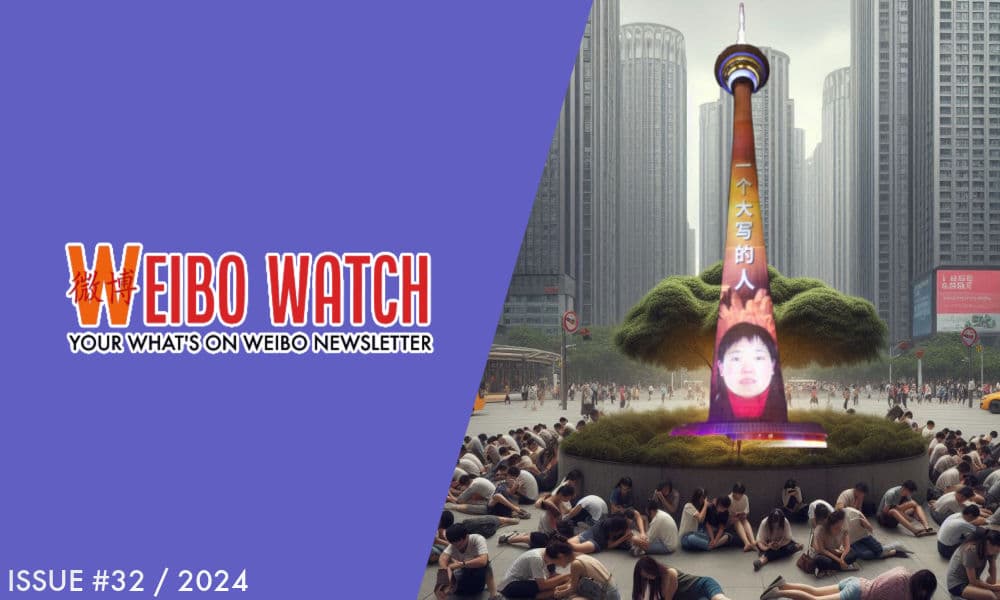
PREMIUM NEWSLETTER | ISSUE #32
This week’s newsletter:
◼︎ 1. Editor’s Note – Get up, stand up
◼︎ 2. What’s New and Noteworthy – A closer look at the featured stories
◼︎ 3. What’s Trending – Hot highlights
◼︎ 4. What’s Remarkable – Seeing little people
◼︎ 6. What’s Popular – Wild Child: missing in action
◼︎ 7. What’s Memorable – Bystander effect
◼︎ 8. Weibo Word of the Week – “City bu City”
Dear Reader,
Over the past few weeks, there has been a lot of discussion on Chinese social media about young people refusing to give up their seats for older people on the subway, sometimes leading to explosive situations.
On June 16, security was called when a young man on a Shenyang subway crumbled after an old man demanded that he’d give up his seat for him. In a video of the incident, which soon went viral, the young man can be heard screaming: “Are you giving me money? No? Then don’t bother me! I’m just happy to be sitting here. What’s wrong with me grabbing a seat?
Another subway incident went trending a week later. On June 24, a 65-year-old man started harassing a young woman on Beijing Subway Line 10 after she refused to give up his seat to him. The man became aggressive, started slapping the woman and put his cane in between her legs, trying to force her to stand up. The incident, which was filmed by other passengers, caused outrage on social media and the man was later detained by Beijing police.
A day later, in Wuhan, an elderly man and a young woman also got into an altercation that was caught on camera. After female passenger took the only available seat during morning rush hour on Line 2, the man reminded her that she should give up her seat out of respect for the elderly. “Why should I?” she asked: “I don’t owe you anything. I work overtime until 12:00 at night every day, and now you expect me to give up my seat during the morning rush hour?”
These incidents have sparked discussions about how people feel about these situations. In China, where respect for the elderly is deeply ingrained in the culture, should you give up your seat to the elderly on public transport because it is your duty, or is it just a personal choice? In an online poll held by Sina News, over 93% of respondents said they felt it was not their duty to give up their seat but a personal choice—a matter of courtesy.
“As long as you’re not sitting in a priority seat, you don’t have to give up your seat,” a top comment said. “It’s not easy being working class.” Many people echoed this sentiment, siding with the younger people who are facing their own tough struggles in China today. “I’d advise the elderly not to crowd public transport during the morning and evening rush hour,” another popular comment said, receiving thousands of likes.
These discussions signal a social shift: “When the topic comes up about young people not giving up their seats for the elderly, have you ever considered that these young people have been working all day? If you feel so strongly about it being your duty, how about you call a taxi for the elderly yourself?”
While many commenters expressed that people are not obliged to give up their seats to others, some, including pregnant women, complained about the overall reluctance of other passengers to give up their seats for them. “It feels like everybody is tired,” one Weibo user wrote.
Standing By
Another noteworthy discussion on Chinese social media recently was not about sitting down but about standing by. In a stabbing incident caught on camera by bystanders, a man locally known as “Bag-Clutching Brother” (夹包哥) was killed in the city of Songyuan in China’s Jilin province on June 30. His real name was Mr. Zhao, but he earned the nickname “Jiabaoge” (夹包哥, “Brother Clutch Bag”) for his eccentric square dancing while clutching a bag.
A video of the horrific incident shows Mr. Zhao happily dancing in a public square in Songyuan, with dozens of people present, when a man suddenly draws a knife and starts stabbing him. As the crowd watches on, the attack continues. Moments later, Mr. Zhao can be seen lying in a puddle of blood while still being attacked. Bystanders did not intervene. The attacker, a local drunk who did not even know “Brother Clutch Bag,” was detained by police. Zhao died of his injuries.
The incident caused a shock wave on social media. “They all stand in a circle and watch,” a typical comment said. “Not one of them stepped forward to help.” Some people called the onlookers “cold and detached” (“冷漠围观”).
While many suggest the onlookers are selfish and too preoccupied with filming to actually intervene, others suggested they were just scared to face the consequences of intervening.
There is a complex interplay of factors associated with the likelihood of people intervening when witnessing a crime or other emergency. Research points out that the higher the levels of fear among bystanders, the less likely they are to intervene. The more they perceive themselves as strong, the more likely they are to help. Additionally, the more people witnessing an emergency, the less personal responsibility is felt, reducing the chances of intervention.
As a victim, you might be more fortunate if just one person sees your predicament—and comes to your aid—than if a hundred people look on and do nothing.
Hu Youping
This issue perhaps also played a role in a third noteworthy topic that became a major trend recently, which I also wanted to mention here. It concerns the death and honoring of Ms Hu Youping (胡友平). Hu Youping, a 54-year-old school bus attendant, stepped in to help when a Japanese mother and child were attacked by a man with a knife at a school bus stop in Suzhou on June 24.
Hu was working that day when, around 4 pm, someone wielding a knife started attacking people at the bus stop near Xindi Center on Tayuan Road. As she rushed forward to stop the attacker, she was stabbed multiple times—one of the stabs hit her heart. On June 26, two days after the incident, Hu succumbed to her injuries.
The story of Hu Youping is remarkable on many levels. Not only was she brave, but she also intervened during a time when multiple stabbing incidents were making the news (also see: Jilin stabbings). Her courage became the focus of Chinese media reports about the Suzhou stabbing, diverting attention from the suspect’s motivations and discussions questioning China’s public safety. Adding to the story is that Hu protected a Japanese mother and child, which, in the context of Sino-Japanese tensions, reinforced her selflessness.
Hu’s face was suddenly everywhere. Netizens praised her kindness, and state media honored her bravery. As she officially received the title of “Model of Righteousness,” she was exemplified as embodying the kindness and courage of the Chinese people by local authorities. The Tianjin Radio and Television Tower even lit up in honor of Hu Youping, projecting her portrait on the side of the building.

Hu Youping is seen as a selfless heroine. Her story is not just propagated by official channels, it also resonates with the people. “People like Ms. Hu Youping and other heroes are remarkable, not only for their willingness to sacrifice themselves but also for inspiring those around them,” one Weibo blogger wrote.
Perhaps Hu Youping is the role model people need at this time, when so many stories about a lack of altruism, conflicting values, and moral crises are trending on social media. She was not necessarily an extraordinary person; she was a normal, kind-hearted and hard-working woman who would not stand by while seeing people in trouble.
However, while Hu Youping’s bravery is inspiring, her courage also serves as a cautionary tale. In one thread about the passive crowds watching Mr. Zhao get killed, commenters wrote: “Look what happened to Ms. Hu Youping. She got killed while bravely intervening, so who would dare to step in here?”
Her courage and ensuing death have ignited a realistic debate on what helping others may look like when confronting an armed attacker directly is not an option: “If someone is attacking with a knife and you are unarmed, your only option is to run. If you can help others to run with you, you are already a hero.”
In the end, Hu Youping triggers discussions on kindness, fearlessness, and doing what’s right. At a time when the social moral compass seems adrift, people like Hu help recalibrate it. Whether it means standing up or sitting down, stepping in or getting out, it’s always best to follow that personal moral compass regardless of what others do. Sometimes, that might mean sitting down when you need to rest, knowing that taking care of yourself is just as important. At other times, it means standing up when nobody else does, and rising not because it’s your duty, but because you know it’s the right thing to do.
Miranda Barnes and Ruixin Zhang have helped compile some of the topics mentioned in this week’s newsletter. As always, please do not hesitate to reach out if you’d like to share something you’ve spotted or share your ideas with me.
Best,
Manya Koetse
(@manyapan)
What’s New

Humble Prodigy or Deceptive Impostor? | It’s rare for a math competition to become the focus of nationwide attention in China. But since 17-year-old vocational school student Jiang Ping made it to the top 12 among contestants from prestigious universities worldwide, her humble background and outstanding achievement sparked debates and triggered rumors.

“Scared to Intervene” | In a shocking incident caught on camera, a well-known Songyuan resident nicknamed “Brother Clutch Bag” was tragically stabbed to death. On Weibo, people have reacted with disbelief.

Another One Bites the Dust | Li Shangfu allegedly “took advantage of his position to seek benefits for others” and received large sums of money.
What’s Trending
JUNE 26
🇺🇸 Biden vs Trump | Just like in the rest of the world, Biden and Trump’s presidential debate became a hot topic on Chinese social media. Chinese America watchers harshly criticized the debate, describing it as a race between a “madman and a senile patient.” Others perceived the overall energy and quality of the debate as indicative of troubled times for America and see the presidential campaign as a sign of Western democracy falling behind. Many commenters suggest that it does not really matter for China who becomes president, as both candidates are expected to adopt a tough stance on China. Nonetheless, there were various posts indicating a preference for Trump because he generates more memes and jokes on Chinese social media and is “more fun to watch.”
JUNE 29
🐼 From Sichuan to San Diego | They are the first set of pandas to make their way to the U.S. in 21 years: Yun Chuan (云川) and Xin Bao (鑫宝) safely arrived in San Diego on June 28 after a long flight from China. Their caretakers in Sichuan had to say goodbye to them for a loan period of at least ten years. On Chinese social media, many commenters expressed sadness about the pandas leaving China, wondering if their American adventure is really in their best interest.”
JUNE 30
🚀 Accidental Rocket | Was it a plane? Was it a meteor? Videos of an explosion in the hills near Gongyi City in Henan recently went viral (link). The huge impact was not caused by a meteor; it was a rocket. While performing a ground test, the Chinese rocket by space startup Space Pioneer (天兵科技) was accidentally launched and crashed near a residential area. There were no reports of casualties. A few days later, Space Pioneer sincerely apologized and promised that the company would compensate anyone who suffered property damage due to the test failure. The incident has sparked questions on why a private enterprise was able to test out rockets in Gongyi in the first place.
JULY 1
🏸 Zhang Zhijie Dies | On June 30, the young Chinese badminton player Zhang Zhijie (张志杰) collapsed and convulsed during a game in Indonesia. Videos of the incident (link) showed how it took about 40 seconds before medics arrived to attend to him. After being rushed to the hospital, the 17-year-old player from Jiaxing, Zhejiang, passed away. According to Indonesia’s badminton association, Zhang died due to sudden cardiac arrest. On Weibo, a hashtag about Zhang’s death garnered over 560 million views (#张志杰去世#) since late June. Zhang’s sister shared her grief and shock about her brother’s death on her Weibo account. Zhang’s mother was so overcome with grief that she had to be temporarily hospitalized earlier this week. Zhang’s family is now in Indonesia, seeking more clarity on his death and holding those responsible accountable.
JULY 2
🚗 Molly and Mr. Musk | “Hello Mr. Musk, I’m Molly from China. I have a question about your car. When I draw a picture, sometimes it will disappear like this. You see it? So can you fix it? Thank you.” Recently, a 7-year-old girl from Beijing named Molly recorded a video for Elon Musk, in which she complained in English about a bug in Tesla’s sketchpad: when adding a new stroke to her drawing, Molly found that previous strokes would sometimes disappear. In response, Musk replied to her on the X platform, “Sure.” The little exchange generated a lot of attention for Molly on Chinese social media, where the little girl was applauded for how she managed to address an issue with her drawing pad directly with Mr. Musk himself.

JULY 6
🌊 Dongting Floods | A dike of Dongting Lake in Yueyang, Hunan Province, burst on Friday afternoon, causing serious flooding in the area. What started as a 10-meter-wide breach eventually became a breach of approximately 225 meters (738 feet) wide. This flooding of China’s second-largest freshwater lake has already affected approximately 5,000 people, and around 3,000 people were relocated on Saturday. Efforts to seal the breach in the embankment in Huarong County are underway, with over 4700 people actively helping to control the flood.
JULY 7
📈 Peak in Death Rates | On Sunday, reports of China facing an imminent peak in death rates went trending on Weibo, where a related hashtag became one of the most-searched topics (#中国将迎来人口死亡高峰#). Chinese news outlet Jiemian News reported on a new study published in the latest issue of the Chinese magazine “Population Research” (人口研究), where researchers predict an unprecedented peak in death rates due to various factors, including China’s rapidly aging population, historical birth fluctuations, and increased longevity. As the aging population from the post-war mid-20th-century birth boom leads to a rapid rise in deaths, researchers emphasize the need to prepare for the societal impacts of this peak, including improved palliative care and better planning for funeral services. “Can we first fix the problem of post-graduate unemployment?” one top commenter wondered.
What’s Noteworthy

Do you remember when US Treasury Secretary Yellen had some supposed ‘magic mushrooms’ in Beijing? The mushroom dish she had at a local restaurant is called “jiànshǒuqīng” (见手青) in Chinese; it’s the Lanmaoa asiatica mushroom species that grows in China’s Yunnan region and is considered hallucinogenic if not prepared properly, causing visions that locals call “xiǎorénrén” (小人人), literally meaning seeing “tiny people.” The Chinese is similar to the English term “Lilliputian hallucinations” that refers to visual hallucinations which could also include seeing tiny humans.
The fact that Yellen had this dish actually made it more popular online in China, leading more people to order the mushrooms through online channels.
This week, one Chinese girl named Xiaolin who had ordered 500 grams of the mushrooms became a top trending topic online. She used them for her mushroom soup and added them to her noodles. She consumed all of the mushrooms within one day. Later that night, Xiaolin started feeling unwell. She started seeing numerous “tiny people” running around her house, and when the little figures tried to whisper in her ear and get into her bed, the terrified girl rushed to her friend’s house, who decided to take her to the hospital due to her incoherent speech and strange behavior. The girl was eventually hospitalized due to wild mushroom poisoning.
The story garnered 160 million views on Weibo (#女子吃1斤见手青后看见一屋人#), where many people are now more aware of the dangers of consuming wild mushrooms if not properly cooked. However, there are also many others who are only more curious now; they also want to see ‘little people’ walking around their house.

Meme comparing Vision Pro to the ‘magic’ jianshouqing mushroom: which surreal experience is better?
Some memes relating to this topic suggest that having “jiànshǒuqīng” is a cheaper and more interactive VR experience than getting the Apple Vision Pro. It surely isn’t something that authorities would like to see more people experiment with: a vlogger who tried out some raw mushrooms on her livestream was immediately shut down this week.
What’s Popular

The highly anticipated Chinese film Wild Child (野孩子) was scheduled for a nationwide premiere on July 10. Earlier this year, Wild Child won the Weibo award for the most-anticipated movie of the year. Starring the immensely popular former TFBoys leader Wang Junkai (also known as Karry Wang 王俊凯, 1999), the film had generated significant excitement among Chinese movie-goers. However, this week, the film distributor abruptly announced the cancellation of its release, citing alleged post-production delays. The cancellation, which quickly trended and sparked widespread discussion on Chinese social media, was particularly surprising as tickets were already being sold in the presale box office.
Directed by Yin Ruoxin (殷若昕), Wild Child is based on a true story about two boys from a poor background who struggle to get by. The film addresses the theme of “children living in difficulty” (困境儿童), depicting the lives of children growing up in poverty. The two boys, one a thief and the other an orphan, are united by fate and bond as brothers as they face their challenges together.
Why was the movie canceled so close to its premiere date? Was the withdrawal a purely commercial decision driven by poor presale figures, as suggested in a recent column by People’s Daily, or were there political motivations involved? Could its theme be misaligned with the upcoming Party’s third plenary session? Or is the portrayal of children facing social difficulties simply too sensitive? While the true reasons remain unclear, many fans are hopeful they will still have the opportunity to see the film.
What’s Memorable

For this pick from the archive, and in the context of recent discussions on bystanders not intervening, we revisit a 2015 article about a young Chinese student who helped an elderly lady who had fallen on the street, only to be held liable for her injuries. Stories like these are often cited to explain why people hesitate to help someone in need.
Weibo Word of the Week

“City or not” | Our Weibo phrase of the week is City bu City a (City不City啊), translated as “City or not?”, a phrase that has recently taken the Chinese internet by storm.
The phrase first became popular thanks to American influencer Paul Mike Ashton, nicknamed “Bao Bao Xiong” (保保熊, Baby Bear), who runs a Chinese-language account on Douyin. On his channel, Ashton shares humorous snippets about his life in China, where he works as an entertainer and tour guide.
In one video from April this year, Ashton posted a clip in which he cycles through the city like a Shanghai ‘city girl’ who often mixes Chinese and English words, calling himself “very city” (“我是好city”). He says: “I’m so city, a city girl. It’s so cool, breezy. Life in the city is so good, I feel so free.”
Ashton later began incorporating this phrase more frequently in his videos, often involving his sister, who also speaks Chinese in these humorous exchanges. Walking on the Shanghai Bund, the brother and sister describe Shanghai as “so city” (“好city啊”). While walking on the Great Wall, Bao Bao asks his sister if it’s “city or not” (it’s not).
In other videos in which the two are traveling through China, Ashton repeatedly asks his younger sister if certain things are “city or not,” to which she usually responds humorously: “It’s very city.”
In this context, “city” has evolved from a noun into a quirky adjective, describing something that embodies the essence of urban life; something that is ‘city’ is metropolitan, lively, and modern. It’s very tongue-in-cheek and also serves as a playful commentary on how young Chinese people often mix Chinese and English words to sound more sophisticated and trendy.
This phenomenon sparked the ‘city or not’ meme, which even reached the Foreign Ministry this week when spokesperson Mao Ning was asked about it. She responded that she had heard about the new use of the phrase and that it is a positive sign of foreigners enjoying life in China.
Chinese authorities and state media have also jumped on this trend to promote tourism. By now, the meme has been imitated and adapted by various local tourism departments. Ashton himself has encouraged foreigners to come and experience Chinese culture (and its very ‘city’ city life), further boosting its popularity.
This is an on-site version of the Weibo Watch newsletter by What’s on Weibo. Missed last week’s newsletter? Find it here. If you are already subscribed to What’s on Weibo but are not yet receiving this newsletter in your inbox, please contact us directly to let us know.
Popular Reads
-

 China Insight3 months ago
China Insight3 months agoThe Tragic Story of “Fat Cat”: How a Chinese Gamer’s Suicide Went Viral
-

 China Music4 months ago
China Music4 months agoThe Chinese Viral TikTok Song Explained (No, It’s Not About Samsung)
-

 China Digital10 months ago
China Digital10 months agoToo Sexy for Weibo? Online Discussions on the Concept of ‘Cābiān’
-

 China Arts & Entertainment12 months ago
China Arts & Entertainment12 months agoBehind 8 Billion Streams: Who is Dao Lang Cursing in the Chinese Hit Song ‘Luocha Kingdom’?






